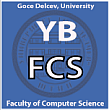E - testing against classical testing in subject Mathematics
Abstract
In this paper we analyze the impact of the knowledge acquired from the previous mathematical education in correlation with knowledge gained from lectures and exercises in Mathematics. Analysis was based on a test. Testing is conducted on students of technical faculties. One part of these students are tested with electronic tests (e - students), and the other part are tested on classical way (c - students). Electronic testing is conducted on Moodle platform for e - learning. The testing covers three topics: integral, functions of several variables and differential equations. The collected data are treated with statistical processing and by results we conclude that c - students are weaker in terms of e - students. However both ways i.e. classical and electronic diverge each other and we cannot precisely define what results are less reliable.
References
Kocaleva. M, Stojanovic. I and Zdravev. Z (2015) Model of e-learning acceptance and use for teaching staff in Higher Education Institutions. International Journal of Modern Education and Computer Science (IJMECS), 7 (4). pp. 23-31. ISSN 2075-017X
Atanasova-Pacemska. T, Pacemska. S and Zlatanovska. B (2012) Moodle as a teaching tools in mathematics - case study in Goce Delcev University, Stip. Yearbook, Faculty of computer sciences, Goce Delcev University, Stip, 1 (1). ISSN 1857-8691
Minkovska. D and Stoyanova. L (2015). Multimedia technologies in engineering education. Yearbook-Faculty of Computer Science, 3(3), pp-15.
Lankford. H, Loeb. S and Wyckoff. J (2002). Teacher sorting and the plight of urban schools: A descriptive analysis. Education Evaluation and Policy Analysis, 24(1), 37-62.


